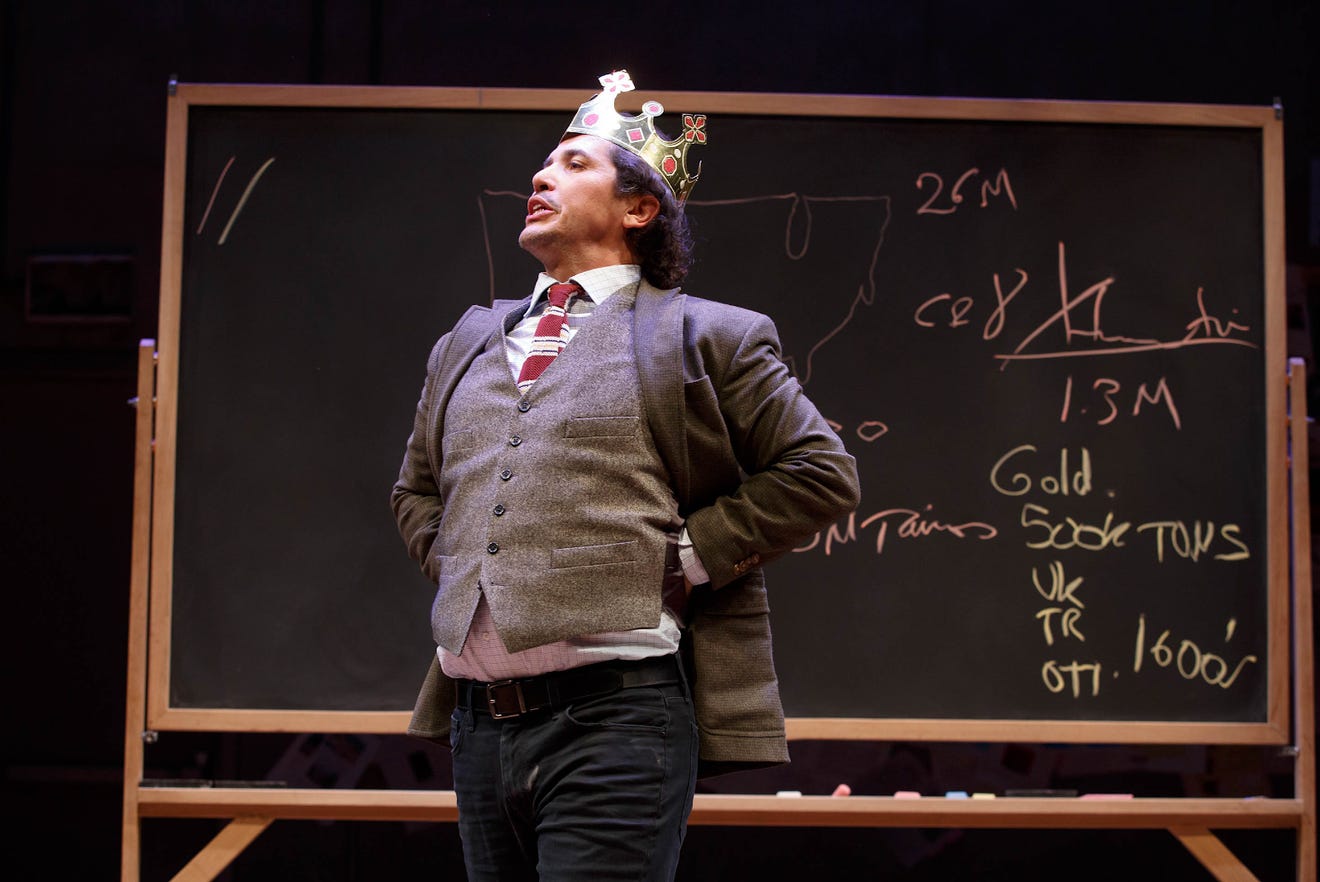John Leguizamo's Hollywood "Colorism" Revelation & How the Industry Kills Latino Dreams.
"I mean, I'd benefitted from being light-skinned and I stayed out of the sun so I could work," he said. "I definitely would not go in the sun for years. A lot of Latinos that made it so far, a lot of them were all light-skinned, you know?"
"What happened to all the Afro-Latinos and the majority of Indigenous Latinos? They don't get a shot. So there's a lot of things we got to deal with in Hollywood, and we gotta fix them. We gotta speak out and we gotta speak up."
This was a highly triggering moment for me. Like the actor, one might consider me "two toned;" summers and sun give me a rich dark hue, in winter this would fade into an olive undertone that would often lead others to confuse me with those from various Mediterranean or Middle Eastern countries. If you are Latino you know colorism isn't unique to Hollywood. I've heard my fair share of "get out of the sun before you turn black" comments in my lifetime. I hear them still, just as I am still forced to play the "you-can't-be Puerto-Rican-you-must-be-(enter country here)" game whenever I'm in a cab or a grocery store or an Italian, Greek, or Indian restaurant. At times, this ethnic "ambiguity" has led to some interesting "opportunities" if you call being an unpaid model on recruiting brochures in almost every academic and corporate institution I've been in since 8th grade, "opportunity."
Two examples of the "Ethnically ambiguous" model being used to recruit or sell books. Times I got paid for these "opportunities:" 0
I got a glimpse at the industry Leguizamo speaks about when I was a young and hopeful actor. After struggling to fit into my own surroundings between home and school, I found a place on the stage in junior high and jumped into theater in high school. I auditioned for every play, participated in speaking competitions, found an agent, got headshots and "pounded the pavement" to see if I could get that early big break, before the realities of adulthood and responsibility could set in. But my experience in the industry killed my dream, in a way that it kills many performers of color.
I remember the roles I auditioned for, and they basically fell into the categories of "young gang member," or "street kid." I remember one particular audition that probably epitomized my experience - a PSA for Covenant House. I said my lines, tears welling up as I looked deeply into the camera, playing the desperate runaway looking for help. I could tell I moved the room. I didn't get it, though. The feedback was that I spoke to too "well." I remember the casting director asking me "Hey, you're from the Bronx, right? Can you talk more like that?" When I told him that I talked how I talked - he responded with the phrase no actor wants to hear at an audition: "Ok. Thank you for your time." I think that was the audition that broke me.
A young Latino male friend of mine was fairing slightly better. I had seen him in a outdoor amateur production playing a young, "street wise" kid who helps a pregnant Latina immigrant woman sneak into the Statue of Liberty after hours so that she could give birth in its crown. Her hope was that her new baby would be a US citizen, and be the hope and future for her family. In this "play," the woman, in full labor, "climbs" to the top of the statue with law enforcement in close pursuit, all the while determined to fulfill the "American Dream." I think they had performed it on the 4th of July.
I remember being envious of my friend being cast in this ridiculous play perpetrating the "anchor baby" stereotype, considered a positive, uplifting Latino story at the time. I also remember that the kid looked like a younger Ralph Macchio, and was much lighter than me. I shake my head thinking about it now. You gotta love the late 80s/early 90s.
That is why I bristle reading comments quick to criticize a performer and what they might have had to do for work, or even the potential possibility of work, especially during a time before #hashtag movements and the ability to communicate directly with the public via social media. I learned quickly that in order to even have a shot at a career, I'd have to "pay my dues" by portraying demeaning versions of myself as victim, criminal, or background, with no real promise that it would get any better. There were no established "John Leguizamos" speaking truth to power, or advocating for people like me. You were alone, you took what you got, or you disappeared.
While I was struggling with all of this I saw Mambo mouth on HBO. There was this young actor who was only about 10 yrs older than I was at the time, was performing a one man show he had written, playing characters HE wanted to play. He cursed and talked about sex and sexuality, immigration and love, with bold characters that jumped off the stage at you. He painted pictures of life in the barrio, among people I recognized and could relate to. I felt pride in his success, like he was there for me and for all of us trying to do what we love in our own unique way.
A few years later, I'd perform Mambo Mouth as my high school senior project in theater. My drama teacher, a magnificent woman named Sue, took a risk with my choice. A high school student undulating, cursing, and cross-dressing on stage in front of Upper West Side parents, even LIBERAL Upper West Side parents, was bound to make administrators nervous.
I remember that each character made me reflect about myself. I had to understand the anger behind the immigrant caught by "la migra," the regret of a boy who grew up too soon, the desperation of a lothario who had to do whatever it took to get what he wanted. I remember struggling the most with the Manny character, afraid of what my friends would think of me strutting in a long blonde wig and high heels. I had to come to terms with why I was uncomfortable with that character, and how I was going to see thru it. I had to see past the jokes, the outfit, and the mannerisms, and focus on the fact that Manny was a survivor of abuse, and she was trying to save her friend. These were multi-dimensional characters I was never offered outside of the school setting, and it allowed me to tap into everything I had, if only for one last time.
Pictures from my 1994 Senior Theater Project. John Leguizamo's "Mambo Mouth."
John Leguizamo and Mambo Mouth threw me an emotional lifeline when I most needed it by helping me understand that maybe my bad luck in the industry wasn't really about me, or a lack of talent or drive, but that the industry itself was not ready. It helped me make peace with leaving this dream, and choosing a different path toward other dreams. I may have decided to leave acting behind, but I now knew that yes, Latinos are entitled to have a place on stage and screen, and they deserve to write their own stories. It gave me hope for the future, and for a brief moment, I was a part of that future.
Those that denigrate Leguizamo for trying to scratch out a career don't understand that for years, the entertainment industry has been in an abusive relationship with the people who love it the most, it's performers. It has set unattainable images of youth, beauty and success, and many have destroyed themselves trying to chase those ideals, all the while hiding their pain to entertain the public. There are multitudes of headstones marking the graves of those who were swallowed up in it all. And there are exponentially more, who like me, never got the opportunity to find out what path they could have set for themselves.
It took decades later for me to start seeing the progress I had hoped for, seeing stories and faces that better reflected the real world around us. And it's just the beginning. I credit Leguizamo's works with helping to inspire kids to find their voice, and perhaps, to not give up their dreams. Could there have been a Hamilton on Broadway without a Mambo Mouth paving the way? Could we have seen the beautiful diversity of Encanto had we not proved that Latino stories not only sell, but have a place in the American narrative? Leguizamo isn't just making his money and going home as many successful performers have done; he is being brave enough to say out loud, and at the risk of his own career, what all of us know to be true, using his privilege to bring attention to it and demand long term change. This is exactly what we should be expecting from many more successful performers of color on stage and screen.
Who else will finally say enough is enough, and demand that the industry show us our stories, and present to us our beautiful people, in all our shades and colors?
I think it's important for you to see the full interview for yourself. John Leguizamo is not only an artistic inspiration, but a real agent of change. I only wish I had heard these words 30 years ago.







Comments
Post a Comment